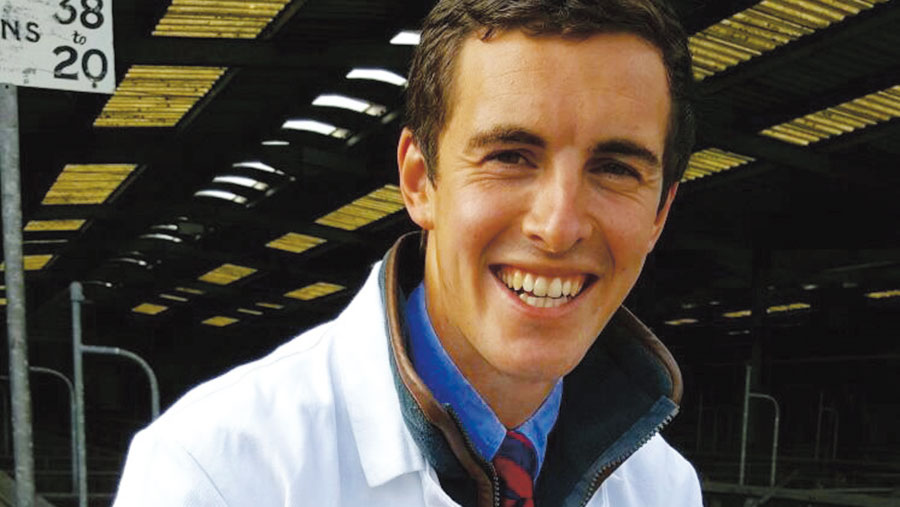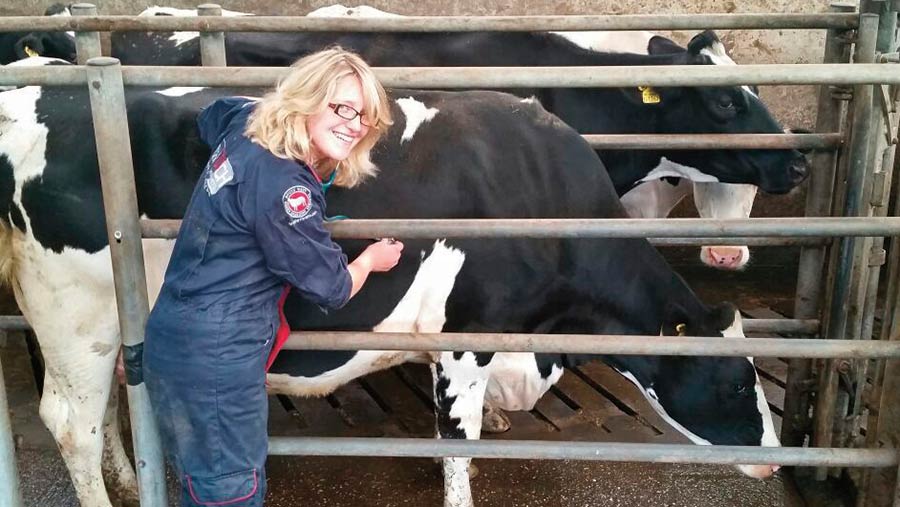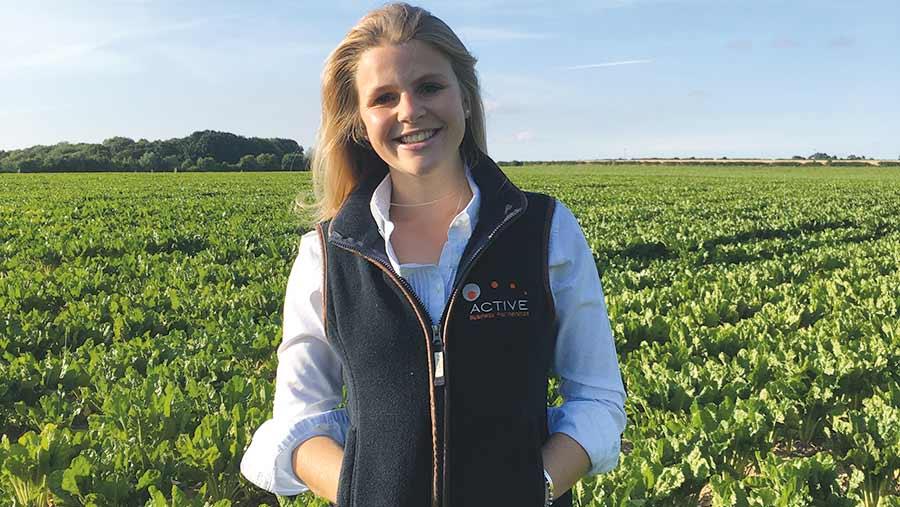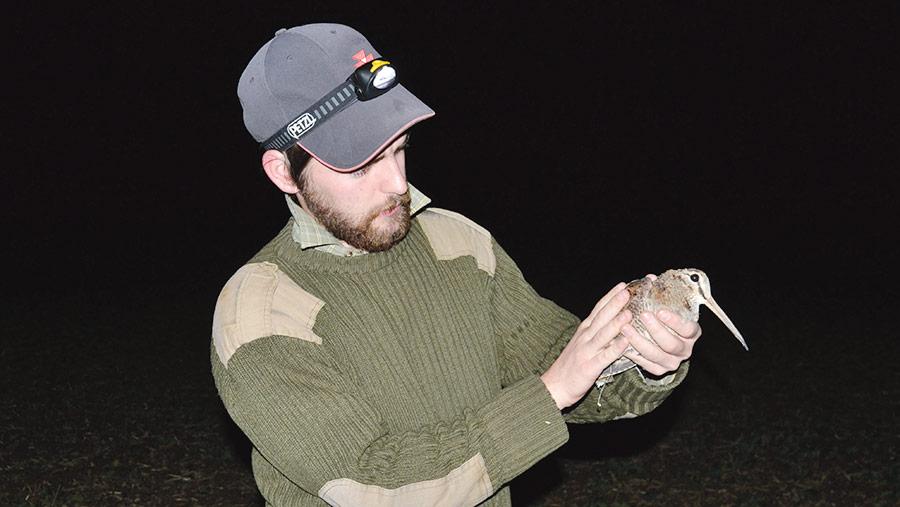Agricultural ancillary careers – varied, exciting and satisfying
The countryside offers a huge diversity of exciting and stimulating jobs, alongside hands-on farming opportunities. We catch up with four young farmers’ sons and daughters who are pursuing successful careers in the ancillary professions to get a flavour of their working lives.
Will Probert, auctioneer
Tell us what your job involves?
I am the principal auctioneer at RG & RB Williams at Ross-on-Wye auction centre. Twice a week I conduct sales of prime lambs, store cattle and calves and store and breeding sheep, as well as carrying out seasonal sales such as straw, collective machinery and farm dispersals.
Advising prospective purchasers and preparing sales catalogues comes with the territory, and I enjoy talking to vendors, buyers, clients and customers.
I’ll also typically spend four days a week on the professional services side, which includes assisting farmers with their BPS applications, farm valuations, and sales of rural, residential and commercial property.
Best aspect of it?
I love the ringside buzz on sale day and being among the chattering of vendors, buyers and customers.
There is nothing more rewarding than receiving a firm handshake from a farmer, him breaking into a smile and saying “you did all right” – because we all know how difficult it is to get a farmer to smile!
Worst aspect of it?
It’s tough to see so many difficulties facing agriculture – the frustrations caused by TB movement restrictions, for example. Many farmers are working seven days a week, 14-plus hours a day, with much of their work going unappreciated by the public.
See also: Careers news and advice from Farmers Weekly
What skills/attributes do you need to do it well?
The ability to value stock or machinery consistently throughout a sale is key to ensuring an auction day runs smoothly. And if you can put on a good show, you will keep your vendors and buyers hooked for the sale’s duration. It’s all about clarity, rhythm and action when auctioneering.
Communication skills are essential, as is the ability to form a working relationship with everyone who enters the mart, whether that’s your largest slaughterhouse buyer or the market assurance inspector.
Knowing your clients, their stock and their system is also key.
Most farmers are related somewhere along the way, so knowing family connections also comes in handy!
Advice to anyone planning to pursue a similar career?
You must be OK with early-morning starts and be able to have bit of a crack with farmers about all sorts of problems and interests – whether that’s a bull breaking into the neighbour’s heifers or a new pedigree tup that has just been bought without the wife’s permission!
Knowing your livestock and knowing its value will earn you respect among vendors and buyers – and keeping both parties happy is essential.
It’s worth contacting your local auction market to see if you can do some part-time work there. If you are keen and stick at it, the opportunity to work up through the ranks may well arise.
Long-term plans?
I hope to maintain my role as a livestock auctioneer, alongside my rural services work, while running the Monmouthshire family farm.
What are salaries like in your sector?
Salaries vary depending on location, age and experience, plus the market’s throughput – but graduate salaries can be in the £20,000-£25,000 range and mid-career auctioneers can earn £30,000-£50,000. As for partners, it really is a case of how long is a piece of string.
Do you need to go to college or university to do your job?
The initial answer is no, as many of the skills are learnt on the job. However, a lot of people do auctioneering in tandem with land agency/chartered surveying and to do this it would be beneficial to go to university to study a course such as Rural Enterprise and Land Management.
This will aid working towards becoming a member of the Royal Institution of Chartered Surveyors (RICS) and the Central Association of Agricultural Valuers (CAAV) – I’m currently doing this, having graduated from Harper Adams University in 2015.
The Livestock Auctioneers’ Association offer a course dedicated to young auctioneers and market staff, run at Harper Adams University, that can be done alongside a full-time job.
How come you didn’t end up back on the family farm?
Although there was a need for me to return full time to the family farm, the current economic climate means it could not justify an additional family member so I pursued a career that works hand-in-hand with it.
I am a partner in the farm and devote my mornings, evenings and weekends to 680 breeding ewes, 60 suckler cows and 32ha of arable production.
Back to the list of people and careers
Reb Cavill, vet
Tell us what your job involves?
I could be scanning cows to check for pregnancies, disbudding goats, blood-sampling sheep, teaching students or even getting my hands dirty with a bit of surgery or calving a cow. That’s one of the great things here at Torch Farm Vets in Devon – it varies so much from day to day.
Best aspect of it?
Getting to know a farm and becoming part of “the team”. Our clients generally like us to be proactive and involved with what’s going on, so it’s great to hear that you have influenced changes that have really helped push things forward.
It’s also nice to revisit the same farms so you can hear that “that caesarean you did last year has calved a year and a day later this time” (one of my recent happy pieces of news).
Worst aspect of it?
Out-of-hours can be rewarding, but it’s difficult to pretend that you love it when the phone rings at 2am for a calving in a field in the rain. Oh, and TB testing (although this is greatly improved by a cup of tea and piece of cake, if available).
What skills/attributes do you need to do it well?
Good communication is key. Being able to build a relationship and gain trust is very important as clients are putting their livelihood in your hands and need to know that they can trust you to make the right decisions and implement the correct actions.
Advice to anyone planning to pursue a similar career?
Be prepared for long hours and finding yourself on call for the one night that everyone else is at the pub/partying. Make sure you have a good support network, especially when you start out – those first few months are quite stressful as you learn how to handle cases and clients.
A wise man told me: “Don’t take a job with the flat above the practice and make sure you always make the nurses and receptionists a good cup of tea”.
Long-term plans?
University sets you up for general/small animal practice and so I made the decision a few years ago to move to farm animals only and have now completed a postgraduate qualification in production animal medicine.
There are options to become a partner/director in firms – although this can be difficult to achieve financially and bears great responsibility so doesn’t suit everyone.
What are salaries like in your sector?
A recent survey from the Society of Practising Veterinary Surgeons suggests that they start anywhere from £28,000 with accommodation and a car included if the job involves on-call.
They are greatly influenced by location, type of practice, experience or level of expertise. If you want to make super money, you need to become a “super vet”, preferably in a London suburb.
Do you need to go to college or university to do your job?
Yes. Competition is fierce for places as there are only eight universities that offer veterinary medicine or science in the UK at the moment.
There’s a lot to learn in the five to six years of training and, with it being a demanding course, you will need top grades in science and maths subjects to get in.
However, some vet schools now offer a gateway course allowing entry on lower grades as long as you meet other set conditions.
How come you didn’t end up back on the family farm?
I always knew that I wanted a career involving farming but was most intrigued by making sick animals better. I was lucky enough to get the grades to make it possible to go to vet school and haven’t looked back since.
Back to the list of people and careers
Alex Olivant, assistant farm business consultant
Tell us what your job involves?
Day-to-day I do everything from dealing with Countryside Stewardship agreements to arranging grain sales, fertiliser purchases, and communicating with contractors and staff for clients. Business plans, budgets and cashflows for businesses, contract farming agreements and Farm Business Tenancies (FBTs) are a major part of the role here at Active Business Partnerships which is based in Nottinghamshire.
Best aspect of it?
Getting to see the same (but different) businesses all over the country. Also, meeting new people and helping them achieve the best from the business is really satisfying.
Worst aspect of it?
Working in the office when the sun is shining, and missing out on being involved with harvest at home.
What skills/attributes do you need to do it well?
You need to be fairly whizzy with a spreadsheet and enjoy working with numbers, paperwork and farmers.
The most important skill is knowing the agricultural language and being able to communicate well with everyone from government officials to office-shy farmers.
Advice to anyone planning to pursue a similar career?
Be confident. I’m a strong believer that you can do anything you put your mind to. Get involved with local agricultural societies or clubs (Young Farmers is a good example) – this shows your potential and demonstrates to any would-be employers that you are organised, involved in the industry and realise the benefit of networking.
Long-term plans?
I aim to be able to help run the family farm with my two younger sisters while continuing my job as a fully trained consultant.
What are salaries like in your sector?
The starting salary a graduate/college leaver/new entrant can expect is around the £18,000-£20,000 mark. However, this can vary a lot depending on the company and is very specific to the person and their experience and knowledge.
Overall, they are competitive and should grow as your personal portfolio grows.
Do you need to go to college or university to do your job?
Agricultural knowledge and out-of-the-box thinking is essential for this job. I went to Riseholme College as an alternative to A Levels, which increased my knowledge of the agricultural sector, and I am proof that university isn’t essential for the job.
There is no specific qualification required to be a farm business consultant, so on-the-job training – such as a bookkeeping course and a farm management development programme – has been the best way to build up my knowledge.
How come you didn’t end up back on the family farm?
Dad always said it was important to go somewhere else before you even think about coming home, in order to learn different ways of doing things. Additionally, I like to meet new people and see new things and going back to the family farm wouldn’t have done this for me.
Back to the list of people and careers
Chris Heward, research assistant
Tell us what your job involves?
My team at the Game and Wildlife Conservation Trust (GWCT) conducts research into wading birds, particularly woodcock and lapwing. When I started here, my role was mostly field-based.
I spent a lot of time radio-tracking woodcock, conducting bird surveys and collecting habitat data. I still do plenty of this, but now I’m also analysing the data I collect and writing scientific papers.
Best aspect of it?
People don’t choose this type of career because they like sitting behind a desk – any ecologist will tell you that it’s all about spending time in the field and enjoying the great outdoors.
For someone who grew up with wellies on their feet and binoculars round their neck, it’s a chance to do something I have always loved for a living.
Worst aspect of it?
One of the worst aspects of the profession is that work can be unreliable and hard to find. I have friends who have struggled to find permanent work in research and it often tends to mean taking short-term contracts here and there.
In this respect, I think I’ve really landed on my feet with my current job, but many other people aren’t so lucky.
What skills/attributes do you need to do it well?
The work is very varied so you need to be a bit of an all-rounder. Clearly a career in research requires a fairly decent grasp of science, maths and English, but my job is also very outdoorsy and practical skills are useful.
This might include anything ranging from bird ID skills to off-road driving, good physical fitness or a realistic understanding of how the countryside works.
Advice to anyone planning to pursue a similar career?
I would put an emphasis on gaining practical skills. After all, lots of people will graduate with a relevant biological degree, but you can really stand out from the crowd with good field skills. The only way to gain these is through experience.
Long-term plans?
The longer I spend away from the family farm, the more I miss it – but I’d also really like to stay in research.
Much of the research carried out by the GWCT has a strong agricultural basis to it, so I hope to find a way of combining both interests.
At the moment there’s a bit of uncertainty as to how that relationship between farming and conservation might change, given recent political events, so who knows what the future holds.
What are salaries like in your sector?
Well, let’s be honest, ecological research isn’t really a career you would go into if you wanted to get rich! For most people, it’s not about the money. Across the board, starting salaries are often in the £17,000 to £20,000 range.
Do you need to go to college or university to do your job?
Yes, you need to go to university. In fact, I’m still at uni really. I completed an undergraduate degree in ecology and environmental science back in 2010. Now I’m studying for a PhD part-time while I work.
How come you didn’t end up back on the family farm?
I wanted to do something else while I was young, to have another string to my bow.




